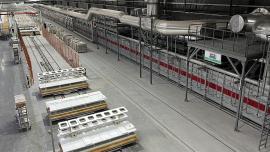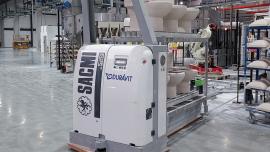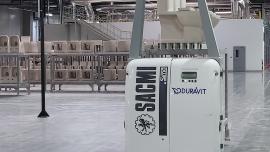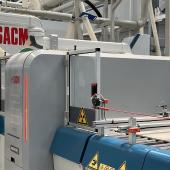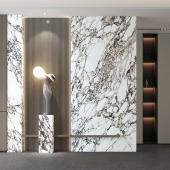Duravit buoyed by strong performance in China
The German multinational posted revenues of €604 million in 2021 (+28%) and aims to reach €1 billion by 2025.
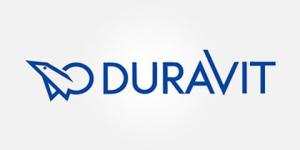
Duravit posted record revenues of €604 million in 2021, up 28% on the €469 million reported in 2020. The German bathroom furnishing multinational’s strong revenue growth was accompanied by an exceptional performance in terms of operating profit, which reached €73.7 million, up 41% compared to the already excellent 2020 result.
The solid fundamentals achieved by the Hornberg-based group confirm the effectiveness of the strategy pursued by CEO Stephan Tahy, who has now set his sights on the goal of €1 billion revenue by 2025.
The success of the local-for-local strategy

The group’s longstanding “local-for-local” strategy, which contributes to its sustainability ambitions, has had a positive overall effect. With production facilities in Germany, France, Egypt, Tunisia, India and China, Duravit has focused on regional production and procurement routes to safeguard its supply capability (products are sold in 130 countries worldwide) despite the scarcity of global raw materials and supply chain bottlenecks.
Much of the growth is a result of Duravit’s operations in China, where it not only generated revenues in excess of one billion RMB (approximately €139 million, 23% of total revenues) for the first time, but also increased its turnover by 32% with respect to 2020.
Stephan Tahy commented: “The reinvigorated retail sector in China played a part along with significant growth in the increasingly important e-commerce sector. Further, demand for higher-quality products such as our SensoWash® shower-toilet is on the rise - especially in the project segment.”
Duravit also reported an excellent performance in its extended “Europa Plus” European sales region, which accounted for more than half of the group’s revenues. Here Duravit successfully strengthened its role as a system supplier for complete bathrooms with sales of €328.6 million (+26.8%).
New design lines win market share
Duravit’s product portfolio comprises sanitary ceramics, bathroom furniture, bathtubs and shower trays, wellness systems, shower-toilets, tap fittings and accessories as well as installation systems.
In addition to the extraordinary performance of previous top sellers, the introduction of new complete bathroom collections has stimulated strong growth. New products include D-Neo by Belgian designer Bertrand Lejoly and White Tulip by Philippe Starck, both of which won the Red Dot Award 2022 in the Product Design category, further underlining the company’s aspiration to be a leader in technology and design.
The D-Neo series, which has already won the German Design Award, impressed both jury and consumers for its sleek, geometric shapes and appealing, flexible and customisable aesthetic. Moreover, its entry-level price has enabled Duravit to tap into younger target groups and create additional attractive offers for the project segment.
In the nature-inspired White Tulip collection, the bathtubs, washbasins, vanity units, WCs, bidets, mirrors and taps take on the delicate and elegant form of a flowering tulip, a timeless design that combines an almost sculptural quality with cutting-edge technology.
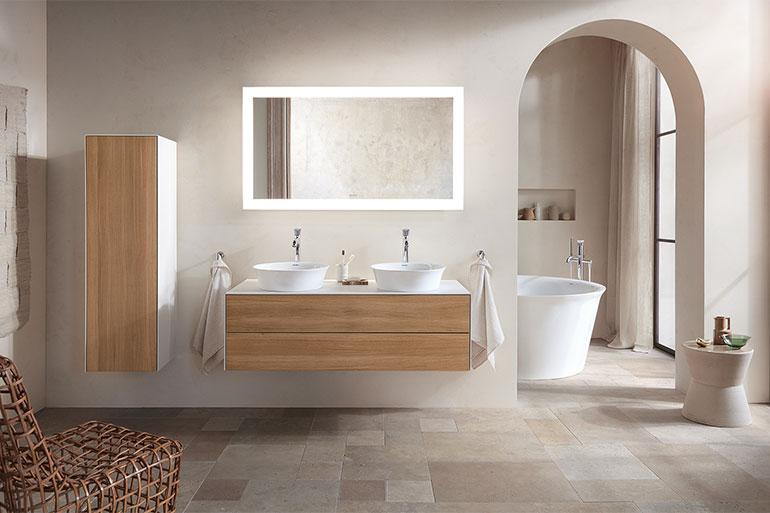

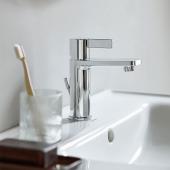
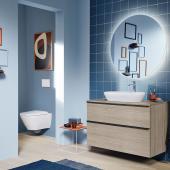
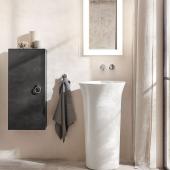
Wholesale and specialist dealers remain the primary focus
In 2021, Duravit achieved growth across all sales channels, from the classical wholesale segment and project business through to the online platform, the latter strengthened by the acquisition of the Bernstein brand and the related Bernstein-Badshop platform.
Nonetheless, explains Tahy, “despite the higher demand for online shopping, our primary focus within the multi-channel strategy is still classic sales through the Duravit brand with the unique quality of expert advice from wholesalers and specialist retailers”.
Towards zero-impact production
As part of a clear long-term environmental commitment, Duravit is driving its sustainability strategy forward and aims to become climate neutral by 2045 without relying solely on offsetting CO2 emissions or emissions trading.
“We strongly believe that ceramic – a sustainable material that has proved its worth over millennia – also has a place in a climate-neutral future,” argues Tahy, who concludes by reaffirming his optimism for the company’s performance in 2022: “We’re currently running at maximum capacity in all markets and we’re proud of our brand and our company. None of this would be possible without the team effort of our employees who recreate this success every day afresh despite challenging and changing prevailing conditions.”
Did you find this article useful?
Join the CWW community to receive the most important news from the global ceramic industry every two weeks







